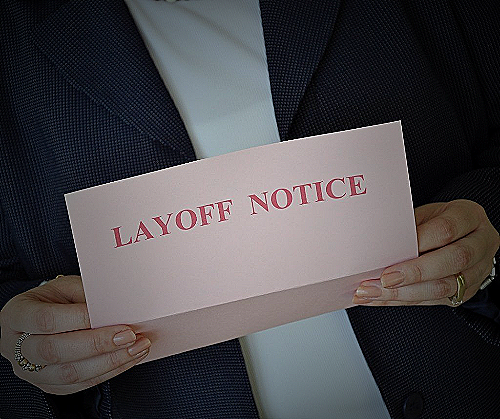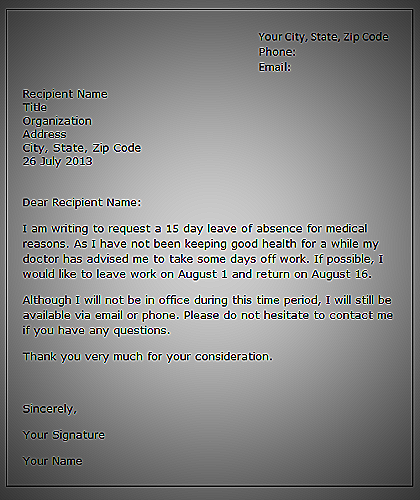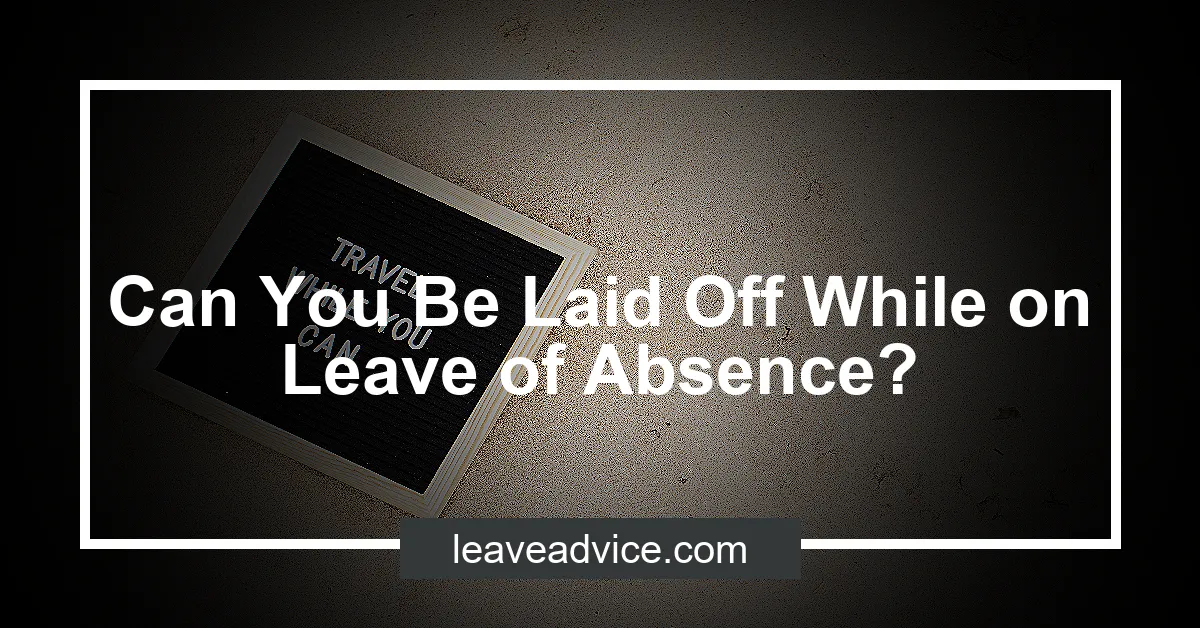Can You Be Laid Off While on Leave of Absence?
Possible rephrased response: Is it possible to be laid off while on a leave of absence?
It is a common question for employees who are on leave whether they can be laid off by their employers. Unfortunately, the answer is yes, it is legal for employers to lay off an employee who is on leave as long as there’s a legitimate business reason.
This includes layoffs due to budget cuts or a change in business operations.
While it may seem unfair, being on leave does not guarantee job security. However, employers cannot lay off employees on leave as a form of retaliation for taking the leave or as a way to avoid paying benefits such as health insurance or workers’ compensation.

What Are Your Rights?
If you are laid off while on leave of absence, you are still entitled to the same rights and protections under the law. You may be eligible for unemployment benefits and continuation of health insurance under COBRA, depending on your specific leave policy and state laws.
Your employer is required to provide you with notice of your layoff and the reason for it.
Are you on leave of absence from work and worried about being laid off? Check out this Youtube video that offers insights and advice on the topic.
Take control of your career and understand your rights – watch “Taking a Leave of Absence?” now.
Understanding Leave of Absence
Leave of Absence or LOA is a formal period of time for when an employee is authorized to be absent from work for a specific reason without forfeiting their job position. There are different types of LOA, including medical leave, parental leave, personal leave, and military leave.
Medical Leave can be taken for an employee’s own medical condition or that of their family members. Parental leave can be taken for the birth or adoption of a child while personal leave is taken for personal reasons.
Military leave is given to employees who are called to active duty in the military.
It’s important to note that benefits during LOA may vary by employer and the reason for the leave. Employee benefits such as health care and retirement benefits are usually maintained during LOA, although there may be restrictions on receiving pay or accruing vacation leave.
Employers are required to follow the provisions of the federal and state labor laws when authorizing or denying any forms of leave.
In the United States, the Family and Medical Leave Act (FMLA) provides certain employees with up to 12 weeks of unpaid, job-protected leave per year. The FMLA also requires that the employee’s group health benefits be maintained during the leave.
A frequent concern for employees on leave of absence is whether they can be laid off while on leave. Unfortunately, employers can legally lay off an employee who’s on leave as long as it is not based on their leave status.
If an employer can provide a legitimate business reason for the layoff, then it is legal. However, it is highly advised that employers discuss layoff policies with their employees and seek legal advice to avoid any legal disputes.
On the other hand, casual leave is a common term used to denote a brief period of leave taken by an employee for travel, vacation, rest, and family events that usually lasts for two or three days. Such leaves are granted to allow employees an opportunity to recharge or attend to personal matters quickly.
Each company may have its own policy on the number of casual leaves an employee may take per year.

Can You Be Laid Off While on Leave of Absence?
It is legal for employers to lay off an employee who is on leave of absence as long as there is a legitimate business reason. This means that the employer can terminate the employment of an employee who is on leave of absence if there is a need to downsize or restructure the company.
However, employers must be careful not to discriminate against the employee because of their leave of absence. Federal and state laws protect employees from discrimination based on their leave of absence, and employers can face legal consequences if they violate these laws.
For example, the Family and Medical Leave Act (FMLA) requires employers to provide up to 12 weeks of unpaid leave to eligible employees for certain family and medical reasons. Employers cannot retaliate or discriminate against employees who take FMLA leave, and they must restore the employee to the same or an equivalent job when they return from leave.
It’s important for employees to understand their rights and protections while on leave of absence and to consult with a labor and employment lawyer if they feel their rights have been violated.
Legitimate Reasons for Laying Off an Employee on Leave
While being on leave either due to medical or parental reasons, employees may be worried about getting laid off by their employers. One question that arises in this regard is, can you be laid off while on leave of absence?
The answer is yes, as long as there’s a legitimate business reason for doing so. Let’s explore some of the legitimate reasons for laying off an employee on leave.
1. Cost Reduction
Cost reduction is one of the top reasons why workers get laid off. Companies usually look for ways to cut down their expenses, and layoffs are one of the easiest ways to do this.
This can be especially true for small businesses that may find it difficult to bear the cost of employee leaves. However, the company must have a legitimate reason to lay off an employee.
2. Staffing Redundancies
Layoffs also occur when a company needs to eliminate some positions due to over-staffing, outsourcing, or a modification to the roles. This can result in some employees getting laid off, even if they are on leave.
However, the company must have a legitimate reason for doing so.
3. Relocation
If a company is relocating to a new location, and an employee can’t move, then it is possible for the employee to be laid off. This can be a legitimate business reason for laying off an employee on leave.
4. Merger or Buyout
During a company merger or buyout, there can be a consolidation of roles and redundancies. This can result in some employees getting laid off, even if they are on leave.
However, the company must have a legitimate reason for doing so.
It’s essential to know that if an employer lays off an employee while on leave of absence due to discriminatory reasons or retaliation, the employee may have grounds for a lawsuit. Employees should consult with human resource professionals to understand their rights when it comes to layoffs while on leave of absence.
Illegal Reasons for Laying Off an Employee on Leave
If an employer lays off an employee on leave of absence, they must have a legitimate business reason. Some reasons such as reducing workforce due to budget constraints or closing the business are legal.
However, there are also illegal reasons why an employee on leave can be laid off, including discrimination based on sex, race, age, religion, or disability. Retaliation for filing a complaint or whistleblowing is also illegal.
If the employer violates the law, the consequences include paying back wages, job reinstatement, and civil penalties.
What to Do If You Are Laid Off During Leave of Absence?
Being on leave of absence due to medical or parental reasons can be a stressful time. For some workers, however, the stress can be compounded if they suddenly find themselves laid off.
If you find yourself in this situation, it’s important to know what steps you can take:
1. Understand the Legality of the Situation
The first step is to understand that it is legal for your employer to lay you off even when you’re on leave. This is as long as there’s a legitimate business reason for the layoff.
2. Check Your Employment Contract and Company Policy
Review your employment contract and company policy to see if they contain provisions for employees who are laid off during leave of absence. Knowing your rights and what measures your company may take can help you better prepare for any potential layoffs.
3. Check Your Eligibility for Unemployment Benefits
If you’re laid off while on leave of absence, you may be eligible for unemployment benefits. Check with your state’s unemployment office for eligibility requirements and how to file for benefits.
4. Communicate with Your Employer
Communicate with your employer and find out the reason for your layoff. If it’s part of a cost-cutting measure, ask if there are any alternatives, such as temporary work or reduced hours, that can allow you to stay on the job.
If you’re collection unemployment benefits, discuss any restrictions that may interfere with continuing benefits.
5. Seek Legal Advice
If you feel that your termination was not justified, consider consulting with a workers’ compensation lawyer for legal advice.
Does The Family and Medical Leave Act (FMLA) Protect Employees Who Are Laid off?
While the Family and Medical Leave Act (FMLA) provides protection to employees who take approved leave for certain family or medical reasons, it does not provide job protection if an employee is laid off for a legitimate business reason. Even if the employee is on FMLA leave, the employer has the right to lay off that employee as long as it is not done to retaliate against the employee for taking FMLA leave.
However, if an employer has a policy of recalling employees who have been laid off, the FMLA requires that the employee on leave of absence should be given the same opportunity to be recalled as other employees who have been laid off.
Employees who are approved for FMLA leave are entitled to job protection during their leave and are usually able to return to their same or an equivalent position after their leave is over. But if the employer has a legitimate business reason for a layoff or termination, employees on FMLA leave are not protected from the layoff or termination.
It is important that employers follow proper procedures during layoffs and terminations to ensure they are not violating any employee rights or protections under federal and state laws. Employers should consult with legal professionals to ensure they are in compliance with the FMLA and other relevant laws.
Conclusion
If you are on leave of absence, it is legally possible for your employer to lay you off as long as there is a legitimate business reason for it. Layoffs happen due to different reasons, including cost reduction, over-staffing, or company restructuring.
It is essential for leaders to give their employees explicit permission to deal with crises and show up quickly. The Family and Medical Leave Act (FMLA) grants qualified workers up to 12 weeks of unpaid leave without losing their job.
References
- Yes, It’s Legal: Companies Are Laying Off Workers on Leave, and Some Have No Right to Return
- Casual Leave
- Top Reasons Why Workers Get Laid Off
- Off During Workers’ Compensation: What Happens to My Job?
- How SMBs Can Manage Their COVID-19 Response
- What Is the Family and Medical Leave Act (FMLA)?
- Evaluating Information Sources

